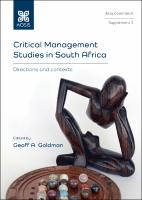Critical management studies in South Africa
Directions and contexts
Author(s)
Goldman, Geoff
Callaghan, Chris
van der Linde, Tjaart
Taljaard, Ruan
Tankou epse Nukunah, Chimene Nkouamou
Eccles, Neil
Katumba, Josephine
Maboke, Phenyo
Teles, Daniella
Smit, Maria M
Pretorius, Marius
Le Roux, Ingrid
Rosslyn-Smith, Wesley
Letsholo, Rebaona
Crous, Frederik (Freddie)
Contributor(s)
Goldman, Geoff (editor)
Language
EnglishAbstract
This book shows how Critical Management Studies (CMS) scholarship is starting to develop a character of its own in South Africa. It attests to CMS slowly gaining momentum and acquiring an identity of its own amongst South African scholars. However, management studies in South Africa is dominated by capitalist ideology and positivist methodology. Although Interpretive scholarship has gained some momentum, it still falls within the parameters of ‘mainstream’, capitalist thinking. Scholarship outside the domain of capitalist thinking, such as critical scholarship, remains sorely underexplored. Being entrenched in the positivist tradition is arguably a major Achilles’ Heel for the progression of management as a field of inquiry. CMS presents a vehicle for alternative epistemologies to be heard in the management discourse. With its focus on power imbalances, struggles for emancipation from oppression, and distrust of capitalism, CMS provides the peripheral point of view with a voice. CMS presents a space where scholars can engage with South African realities surrounding political, cultural, social, and historic contexts and issues in management. This book is promoting CMS to the scholarly community, to show that there are exciting possibilities being offered by a different approach to management scholarship. This book also forms part of a larger project of growing CMS in South Africa, and is a collection of original works by academics actively working in CMS, following various methodological approaches which can be categorised into two broad methodological categories, namely, conceptual work and empirical work following an Interpretive approach.


 Download
Download Web Shop
Web Shop